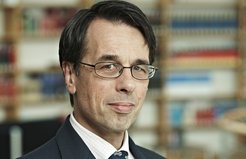Leading thinker in public law
Armin von Bogdandy receives Leibniz Prize from the German Research Foundation DFG
While nation states are the quintessential driving force in public law, international and supranational entities have long been major players too, as Armin von Bogdandy has shown. One of his achievements has been to describe ways in which jurisprudence can grapple more effectively with this state of affairs and thus provide normative orientation.

"To put it in terms Max Weber might have used, I'm more industrial worker than craftsman". Armin von Bogdandy (left) was awarded the Leibniz Prize by DFG President Peter Strohschneider.
"It really was a bit like exploring the Amazon," remarks Bogdandy. That may sound an extravagant comparison—was he in the undergrowth on the wrong track?—but it's apt. Though the Director at the Max Planck Institute for Comparative Public Law and International Law was in fact sitting at his desk rather than exploring the jungle, the difficult, uncharted terrain he found himself in was: what is the actual legal basis for the OECD's PISA studies?
This was just one of the key questions asked in a case study as part of one of his research projects. Bogdandy noted in particular that international players have become so powerful that their decisions affect individual citizens in a palpably concrete manner, quasi over the heads of the nation states in question. "The PISA studies are carried out by the OECD, an international organisation, yet they've shaken Germany's education policy to the core and sent shock waves through the entire school system."
This insight has relativised in an inwards direction the modern conception of the state as the only entity exercising public power. To create a bridge, Bogdandy and his team have modified this interplay and coined the phrase "exercising international public power". "This central concept gives one an improved understanding of these phenomena at the supranational level," notes Bogdandy. It also makes it possible to analyse these processes, which are taking place on a number of different levels, in their entirety—the complex nature of the OECD's PISA policy, for example. The result: "The processes that form the basis for the PISA studies and feed back to the individual states are basically very compelling and highly professional. It's conducted as though in a German ministerial bureaucracy, but with different legal instruments."
For Bogdandy, the normative aspects of this field are of particular importance: from the standpoint of democracy and the rule of law, a key question is: how legitimate are these phenomena of exercising international and supranational power? "As part of PISA policy, it may be more prudent to involve parliaments more intensively, since education policy affects society a whole," he says.
The euro crisis and its risks
This legitimacy deficit has proved even more significant in the handling of the euro crisis, particularly the Greek bailout, he goes on. "Analysis has shown that it's hard to tell which of the three troika members really bears responsibility – the European Commission, the European Central Bank or the IMF. That's a minimum requirement we expect to be met when public power is exercised." Bogdandy has voiced these criticisms, along with proposed solutions, in the culture sections of major newspapers, thus making them part of the political debate. He considers this the "other part" of his job as a researcher in the humanities and social sciences.
Lawyer and philosopher
Having started out as a lawyer, Bogdandy (53) also studied philosophy, writing his doctoral thesis on Hegel's Theory of the Statute. He obtained his German post-doctoral lecturing qualification at Freie Universität Berlin in 1996. After stints abroad in Paris, Rome, Florence and Warwick, his first professorship was at the Goethe University Frankfurt in 1997; he still participates in various activities there, as part of the 'Formation of Normative Orders' Cluster of Excellence. He has been a Director at the MPI for Comparative Public Law and International Law since 2002; he is married with two children and lives in Heidelberg.
He doesn't have a reference library at home—"to put it in terms Max Weber might have used, I'm more industrial worker than craftsman," he says—but the Institute's excellent research library is ready to hand. Not that he's always there: he travels a lot and has research contacts all over the world, partly as a result of guest professorships he has held in various countries, including France, China, Mexico and the US. He has twice been a member of the Hauser Global Law Faculty at NYU, and is a regular contributor at NYU's Straus Institute for the Advanced Study of Law & Justice.
The award ceremony for the Leibniz Prize, one of Germany's most important research awards, was held in Berlin on March 12. Bogdandy plans to use the €2.5 million award to bring more foreign scholars to the Institute in Heidelberg. "There also needs to be a big book at the end of it," he remarks, with the intention to develop his research concepts into a comprehensive theory of public power. Further exploration lies ahead, no doubt.
JE
